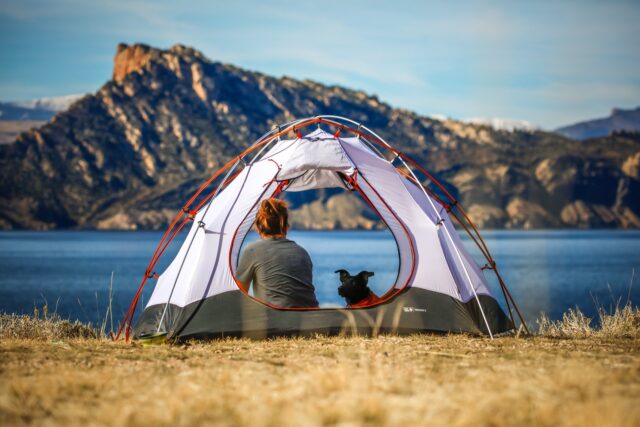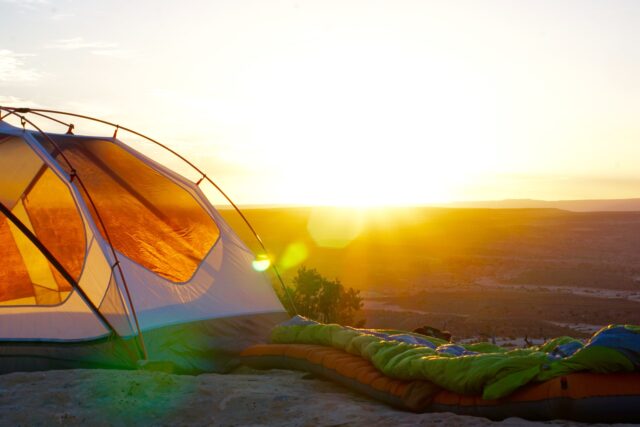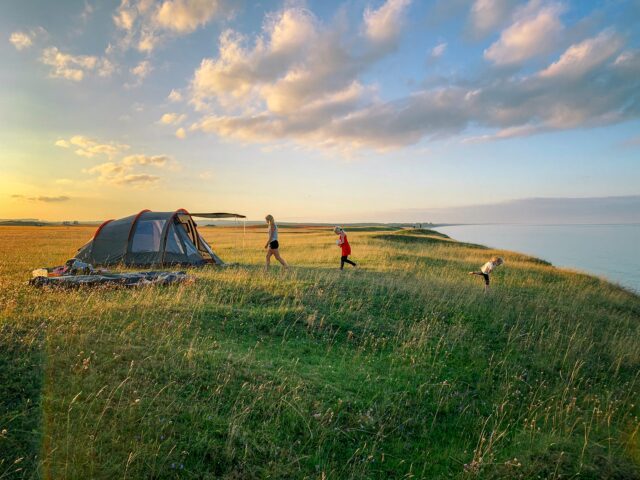
Professional campers love their equipment and take care of it as it saves the day once they are out in the nature. If properly looked after, your tent will last many trips, and it slowly grows more and more comfortable over time.
Taking care of one’s gear is a reasonable thing to do and cost-effective as well since you don’t have to buy new stuff all the time. Good care always reaps its rewards, but how do you protect your tent in the best way possible?
Here are 9 tips on how to take care of your camping tent.
1. Learn how to set it up

Practice setting up the tent beforehand, don’t wait till the trip to make your first attempt. Try erecting your tent a few times in your garden or the lawn and get a feel of how to build and stake it properly. Initially, consult the user manuals or follow tutorials on how to set the tent up.
Some tents might be intended to survive the harshest of weathers but an improper setup wears them down very quickly. These practice runs help you to avoid ripping or breaking any tent parts later on. While this might seem like a pointless exercise, you will be thankful for the experience when you arrive at your camping spot, tired, and wanting nothing more than to get into a snug sleeping bag.
2. Choose your spot and tent wisely
The location where you set camp can make a huge difference in keeping your tent safer. Select a location that is as flat as possible, and preferably somewhere high so that you’re safe if it rains.
Choose an open clearing instead of a canopy of trees to avoid the risk of branches falling on your tent. Finally, choose a protected, safe area instead of an exposed ridge: while the view may not be scenic, it guards the tent against strong winds.
Your choice of tent also makes a difference: not all tents are all-weather, lightweight, strong, and durable. Decide upon a tent based on the climatic conditions and other features of your destination. If you’re confused about which tent to buy, this guide may help you select one.
3. Be careful with zippers

Zippers are one of the more fragile parts of camping equipment. I have seen people get frustrated when it gets caught, and let me tell you that tugging it harder is not the solution. Be patient, slide it back and remove anything that it may have been caught on instead of trying to pull it harder.
To improve your zippers’ performance, clean them with a brush and wet cloth once in a while: this clears away the dust and sand which they may have collected. If it starts to get stuck regularly, free it up using lubricants or wax: you could try rubbing on it with hardened wax from candles.
4. Waterproof your tent
Heavy rain is the least desirable weather on any camping trip. While you cannot control the weather while camping, the next best option is to prepare yourself in the best possible way.
While many tents come already resistant to water, it’s always safer to waterproof them completely. Waterproofing makes your tent completely impermeable to water, which is something you should consider investing in if you’re an avid camper. You can find more waterproof tents on campingvalley.com.
5. Ground cover

While most tents may be able to withstand the elements from all directions, some campers don’t consider that it is in direct contact with the ground all the time. Your tent will get worn down much quicker if you don’t provide ample protection against worms, small stones, or moisture seeping in from the earth.
Using a groundsheet, a tent footprint or a large piece of tarpaulin underneath the tent is a good way of making it more secure. While keeping the tent clean of dirt, this added layer also brings more comfort and warmth to the floor inside.
6. Clean and dry completely after use
An important part of camping that many campers disregard is their post-trip duties. Most people dump their apparel once home and forget about it till their next trip. Don’t be like most people, be smart instead.
Clean your tent of all food crumbs, small stones, bugs, or dirt that it may have collected. Wipe down your tent properly with mild soaps if possible, don’t use cleaning agents or chemicals. Before packing it away, make sure to check thoroughly for any mildew or fungi and remove them immediately if spotted.
You also need to make sure your tent is drying before packing it. Moisture adversely affects the seam tape and polyurethane coating on your tent when packed tightly. A good way of drying out your tent is to set it up once at home after cleaning it.
7. Storing your tent
After cleaning it, the next step is to store your tent properly. Put the tent and its parts away in a sensible, organized manner: this makes packing for your next trip simpler. For example, store the pegs, poles, tent ropes, and mallets together as they’re all pitching equipment.
When you put your tent away for a long time, cramming it into a small stuff sack will stifle it. While this is fine for a short while (like when coming back home from camp), store it more freely when you put it away. This gives the material room to breathe and avoids crumpling. Also, storing all your equipment in a waterproof bag is recommended, or at least make sure they’re stored somewhere cool and dry.
8. Keep away from hazards
A somewhat obvious point but necessary all the same, try to keep your tent away from potential harm. Setting up your fire near camp is not very wise, and nor is handling scissors or other sharp objects inside or near the tent. Loose tent pegs, cooking utensils, and sharp branches are common possible hazards at a camp.
Minimize the opportunities for accidents to occur. The more slashes and tears your tent suffers, the shorter its lifespan gets. If it suffers any holes or burns, try to get it repaired immediately: bringing me to my next point.
9. Be ready to repair

To stay on the safe side, always keep spare tent parts and repair material at hand when you go on camping trips. These include adhesive tent patches, a tent sewing kit with strong thread, spare pegs and ropes, duct tape, and scissors.
While being a great short-term fix if you tear your tent, using duct tape is not a permanent solution. Remember to fix your tent when you end your camping trip. These small actions can go a long way in extending your tent’s life.







